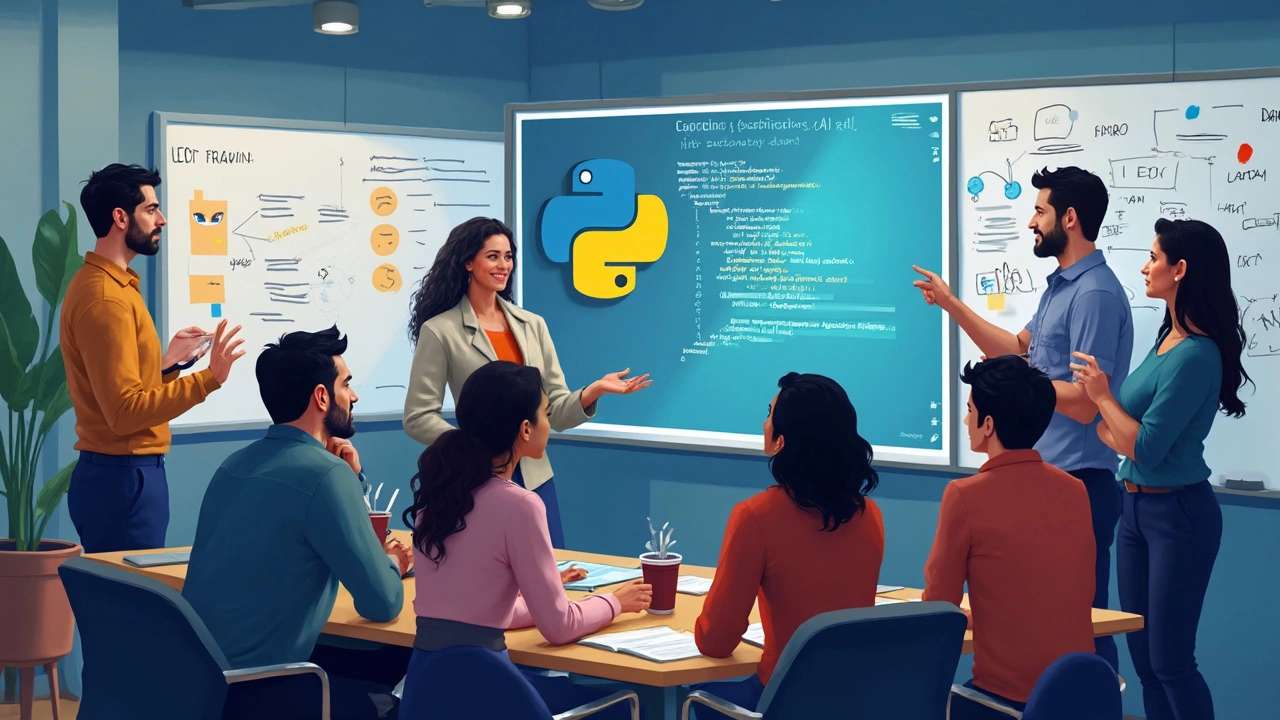You’ve probably heard someone say, “Just learn Python—you’ll land a job, easy.” It sounds tempting, right? Python’s everywhere, from big tech companies to the scripts that help you pick a movie. But is it really a magic ticket to a paycheck?
If you crack open a random job site, you’ll see Python show up all the time. Companies want it for data analysis, web development, machine learning... the list goes on. It’s popular because it’s simple to pick up and you can actually do something useful with it pretty fast. But here’s the catch—not every “Python job” asks for just Python. Some want a bunch of other tools and skills, even for an entry-level gig.
- Why Everyone's Talking About Python
- What Jobs Actually Use Just Python
- When Python Alone Isn't Enough
- Tips to Make Python Pay Off
Why Everyone's Talking About Python
If you hang around any coding forum or ask someone about getting started in tech, Python is the first word out of their mouth. There's a real reason for that. Python has blown up in the last decade, and it's not just hype—it's actually everywhere.
One big reason: Python is super beginner-friendly. Its code looks like plain English, so you don’t have to waste time memorizing confusing symbols. You write something like print("Hello, world!") and it does what you expect, no drama.
But it’s not just newbies who love it. Tech giants like Google, Netflix, and NASA use Python for everything from automation to scientific research. Want an example? Instagram runs much of its app backend using Python, which helps them handle millions of posts and likes daily without melting down.
Another reason Python’s popular is the crazy amount of libraries you get for free. If you’re doing data analysis, web apps, automation, or even building a robot, there’s a ready-made Python library for just about anything. And you don’t have to start from scratch or reinvent the wheel every time.
| Field | How Python Is Used |
|---|---|
| Data Science | Crunching numbers, making graphs, predicting trends |
| Web Development | Building websites and APIs (think Django, Flask) |
| DevOps/Automation | Automating boring stuff—backups, tests, server updates |
| AI & Machine Learning | Training models, analyzing images, chatbots |
Let’s talk numbers for a second. According to Stack Overflow’s 2024 survey, Python was ranked the number one "most wanted" programming language for the sixth year in a row. No wonder: you’ll see Python in over 70% of data science job listings, and it’s riding high on the "hottest skill" charts for just about every tech career.
Why does this matter for jobs? Easy: you show up with Python on your resume, and hiring managers at hundreds of companies instantly know you’ve got something valuable. It’s like having an all-access pass—at least for getting your foot in the door.
What Jobs Actually Use Just Python
So, what jobs really depend on Python alone? There are a few out there, but they’re not as common as you might think. The most straightforward roles usually pop up at startups, small businesses, or companies testing out new ideas. They want things built fast, and Python gets the job done with less hassle. For these gigs, showing you know your way around Python is all you need—no fancy extras.
Let’s get specific:
- Junior automation tester – Lots of companies hire people to write scripts that handle repetitive work. Stuff like web scraping, data cleanup, and simple task automation often runs just on Python.
- Entry-level data analyst – Smaller companies doing basic reports are okay if you just know how to crunch numbers with Python’s libraries like pandas and matplotlib.
- Python tutor or coding camp coach – Organizations running coding bootcamps or after-school clubs want Python instructors who can teach the basics without much else.
Now, when you look at the numbers, you’ll see it’s pretty rare to find jobs looking for Python and nothing else. Check this out:
| Job Title | Percentage Demanding Only Python |
|---|---|
| Data Analyst | 12% |
| Automation Tester | 9% |
| Entry Developer (Generalist) | 5% |
This table’s based on a sweep of job boards from early 2025. So yeah, these roles exist, but not in huge numbers. If you want to stick with just Python, stay alert for these job titles and keep your projects simple but impressive.

When Python Alone Isn't Enough
A lot of folks dive into coding thinking Python is like a skeleton key—just learn it and every door opens. But when you start checking out real job listings, things get a little more complicated. Most companies aren’t just looking for coding in isolation. They want someone who can actually solve their particular problems using the right mix of tools.
If you want to work as a data analyst, for example, Python is a must. But nearly every job asks for more: SQL for databases, Excel for quick reports, maybe even a bit of Power BI or Tableau. For web development jobs, just knowing Python won’t get you hired—you’ll need frameworks like Django or Flask on top of basic HTML, CSS, and JavaScript.
Even entry-level roles are a mix these days. Take a look at actual numbers from a survey by Stack Overflow in 2024: less than 5% of developer jobs mention only Python, with zero other skills required. The rest? They bundle Python along with other tech stacks, from cloud services (AWS, Azure) to version control (Git), and plenty of roles want you comfy with Linux too.
| Job Role | Python Required | Other Key Skills Needed |
|---|---|---|
| Data Analyst | Yes | SQL, Excel, Tableau |
| Back-End Web Developer | Yes | Django/Flask, HTML/CSS, JavaScript |
| Machine Learning Engineer | Yes | TensorFlow/PyTorch, Statistics, Data Wrangling |
| Automation Engineer | Yes | Bash/Shell, CI/CD Tools, Git |
If you want a competitive edge, here’s the deal:
- Pair Python with a database language like SQL. These two show up together in tons of listings, especially if you’re after data-driven roles.
- For anything web, learn at least one Python web framework plus basic front-end stuff. Even a tiny personal website helps you stand out.
- Understand how to use Git for version control. Almost every tech job expects this now.
- If you love data, pick up something like pandas or NumPy in Python, but don’t ignore Excel or reporting tools—even if they seem basic.
The real job market wants well-rounded folks, not someone who just stopped at "Hello, World." To really cash in on that Python knowledge, build up a combo of practical skills that show you can take a project from idea to finish line.
Tips to Make Python Pay Off
If you're after a job that uses Python, don’t stop at just learning the basics. While knowing how to print "Hello, world!" feels like a win, employers look for more. So what should be on your to-do list if you want Python to actually land you a job?
- Build real projects. It’s way easier for managers to trust you can code when they can see what you’ve made. You don’t need to invent the next TikTok—start with things like a web scraper, a budget tracker, or a simple website using Flask or Django. Bonus points if you put your code on GitHub; that’s your new tech portfolio.
- Learn to use extra tools. If you’re eyeing data-focused roles, practice with libraries like pandas, NumPy, and Matplotlib. If web stuff is your thing, Django or Flask knowledge really helps. In automation jobs, knowing how to use Python with tools like Selenium can open up a ton of doors.
- Show you get how things connect. Being able to use Python is great, but most jobs mean working with databases (like SQL), APIs, or even different coding languages. Knowing how Python fits in with these is huge. For example, you could automate sending reports from a database and email them with Python. That’s the kind of skill hiring managers remember.
- Be active, not just a lurker. Join coding groups online (Discord, Slack, Stack Overflow) or in your city. Often, jobs come from someone you met, not an online listing. You’ll learn from others too, maybe spotting which new skills matter in your area.
- Keep your resume and LinkedIn up to date. Focus on actual results you achieved with Python, not just “I know Python.” Something like, “Automated weekly reports that saved 2 hours per week” stands out way more. Don’t forget to mention your projects and link to your GitHub.
There’s no secret shortcut. But if you treat learning Python like building up a toolbox—adding projects, using libraries, sharing your work, and networking—you’ll put yourself in front when companies need someone who can actually deliver. That’s when the Python hype finally pays off for you.
